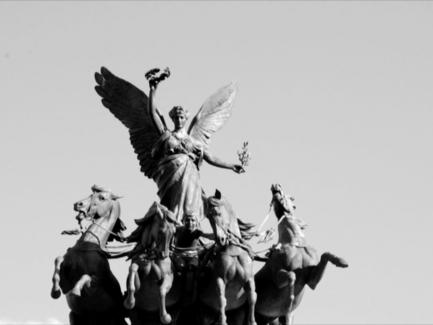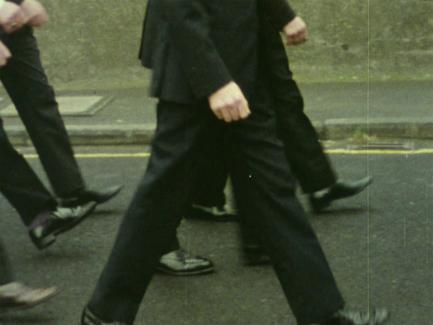Orifso
Lis Rhodes (1999; 12 mins., 50 secs.)
Orifso focuses on two historical case studies to question the boundaries humans create to protect wealth or power. The film begins with disorienting scenes of an abandoned house, running water, and dead flies. A cacophony of voices and crackling noises give way to silence, as the scenes change to images of a French landscape. In this silence, the landscape itself serves as a memorial. The rural road that appears in the film was a tightly controlled artery between the Free Zone and the territory occupied by the Nazis during the Second World War. Despite the immense danger, local villagers worked to undermine the Line of Demarcation, assisting Jews and members of the French Resistance to cross.
The rural dirt roads of 1940s France transition to the paved streets of London in the 1990s, lined with police barricades. After the London Docklands bombing by the Irish Republican Army in the city’s financial district in 1996, the police set up checkpoints to monitor every vehicle that came and went. The surveillance continued for several years.
About Lis Rhodes
The artist and experimental filmmaker Lis Rhodes (born 1942) has been a major figure of the British feminist and avant-garde film scene since the early 1970s. Described as “visual abstractions,” her practice moves across performance, installation, sound art, writing, and film. Much of Rhodes’s work is concerned with exposing the power relationships between language and observation, and the political significance of each. As an artist, as well as a campaigner for women’s rights, a film programmer, and an educator, her work has covered a wide range of issues, including domestic violence, nuclear power, and migrant labor. Early films, such as Dresden Dynamo (1971), explore the relationship between sound and image, while other works, such as Light Reading (1978), pioneered a genre of discursive feminist cinema. In 1979, Rhodes cofounded Circles, a women’s film distribution network, and was also a key figure in the London Film-Makers’ Co-Op (1966–99). In the 1980s and 1990s, much of her work transitioned to a focus on global politics and critiques of neoliberal economics, themes present in Orifso (1999) as well as one of her most recent works, Ambiguous Journeys (2019). Rhodes was the recipient of the Freelands Award in 2017, and her work has been shown and is included in numerous international collections. The artist lives and works in London.
Written by Adam Chen (TD 2022)


